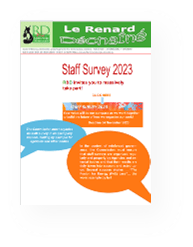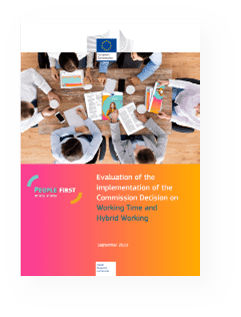Staff Survey 2023
R&D invites you to massively take part!
DG HR has announced the new edition of the “Speak Up” staff survey. R&D would like to remind all colleagues that Staff Surveys are an essential tool for measuring the satisfaction of staff on their working conditions. However, for a survey to be meaningful, several prerequisites and conditions must be met.
First and foremost, colleagues must feel that they can give honest feedback without the fear of reprisal; they also need to be confident that the survey is indeed anonymous and that their data is safe and that it will not be manipulated.
Secondly, the added value of a Staff Survey doesn’t come from gathering information. It depends entirely on how the institution uses that information. Once the feedback has been collected and the results have been analyzed, it is the time for the administration to act. All the issues that emerge from the survey must be collected, the actions to address them must be identified and finally a detailed action plan must be drawn and implemented as quickly as possible.
Thirdly, Managers must lead by example; they must show that the staff feedback is taken seriously and that necessary actions are prioritized in order to address any matter of concern, while always keeping the staff in the loop regarding the progress.
1) The Commission must organise its staff survey in an exemplary manner, leading by example for agencies and other bodies.
The Commission’s Staff Survey 2023 is now open, and R&D invites every colleague in the Commission, the Offices and the Executive Agencies to respond massively, so that the staff’s voice and their opinions can be heard and so that the Commission can draw all the consequences and finally put in place policies that truly meet the expectations of the staff! It must be confirmed that the Staff Survey is totally anonymous.
The Staff Survey 2023 is more than ever crucial because it will provide, above all, the picture of your assessment of the implementation of the decision on post-Covid hybrid working.
In particular, in the Staff Survey 2023, the focus will be put on our new way of working. Above all, it will be a question of expressing your appreciation of the changes introduced by the decision on hybrid working conditions (C_2022_1788).
The weight of your opinion will enable us to successfully resist the impulses of those, who, by denying the culture of trust advocated by Commissioner Hahn and fully supported by R&D, want at all costs to return to the “old regime” based more on mistrust and on the sterile control of office attendance, despite the outrageous building policy of our institution which has deprived colleagues of a real office.
R&D mobilises the best experts!
For its part, as in previous Staff Surveys, and assisted by the best experts in the field, R&D is committed to carrying out in-depth analyses of the results, drawing on scientific research on the various themes addressed and once again organizing thematic conferences (e-Conferences of the “Renard” – Renouveau & Démocratie (renouveau-democratie.eu) ).
These analyses will be all the more important given that, as part of the negotiations for the new decision on fighting all forms of harassment that will be very soon adopted by the Commission, we have obtained a formal inclusion of the Staff Survey results among the tools for detecting cases of harassment and ill-being among staff within a department. To this end, for the next Staff Survey, we will be proposing specific questions drawn from scientific questionnaires on the prevention of psychosocial risks.
These efforts are essential because we are not protected from the risk of new attempts to make these results depict “what a DG wants its staff to say”, rather than what our colleagues have really expressed, by indulging in cosmetic feats and memorable efforts at embellishment.
“Know where you come from to know where you’re going”.
Besides, we must never forget “where we come from”. Indeed, if today everyone stresses ̶ or no longer openly denies ̶ the importance of the Staff Surveys, this is the culmination of a long journey and tireless commitment of R&D .
In the past, we have always denounced the lack of will of the administration, which for a very long time used to organize the Staff Surveys in a purely bureaucratic and self-congratulatory manner. Cosmetic efforts were systematically made to embellish the presentation of the most critical results.
By overcoming the fierce resistance of the administration and of several Directors-General and by responding favorably to R&D requests, Vice-President Georgieva had, for the first time, required each Director-General and Head of Service to discuss the results of the Staff Survey at ad hoc meetings in each Unit and Directorate, and to draw conclusions and consequences from the assessments made by the colleagues under their authority.
Nevertheless, after Ms Georgieva’s departure, while several Directors-General had offered their support to our efforts confirming that they were fully aware of the importance of this exercise and fully committed to its fair implementation, certain “inflated egos” continued not to tolerate colleagues expressing themselves and stating their opinion. The communication of results was still too often partial, biased, highlighting only the positive results while ignoring the negative ones. Subsequently, the actions taken were all too often window-dressing.
With DG HR still unable to rectify these practices and/or ensure any real coordination at institutional level, R&D had to intervene on several occasions with the Commissioners responsible for Human Resources in order to put an end to these detestable practices (link).
As far as transparency in the publication of results is concerned, the staff survey 2021 was another step in the right direction, even though not all results per Directorate have been published and some DGs with the worst results often failed to take any concrete action.
In order to avoid the past errors, R&D asks Commissioner Hahn to ensure that the Staff Survey 2023 sets the benchmark, once and for all, concerning FULL TRANSPARENCY of the results and that ALL consequences are drawn from them. Transparency is a key value in the culture of trust!
R&D is, thus, calling for the following to be made available:
- – Detailed results by DG, Service AND ALSO by Directorate,
- – Details of responses by staff category,
- – Publication of answers to open questions
2) In the context of reinforced governance, the Commission must ensure that staff surveys are organized regularly and properly by Agencies and external bodies and that their results are duly taken into account and acted upon.
R&D welcomes the strengthened governance decided by Commissioner Hahn and put in place towards Agencies and external bodies.
It has always been clear for R&D that it is above all strengthened governance by the Commission, as guardian of our Staff Regulations and member of the governing bodies, that can restore proper functioning and put an end to abuses. In all cases, it is the Commission that is politically accountable to the supervisory authorities and in the context of the discharge procedure.
This is why R&D negotiated, as part of the latest reform, the strengthening of the Commission’s role in the governance of the executive agencies and we are now delighted that Commissioner Hahn and the Secretariat-General responded favorably to our request to strengthen the Commission’s role also in the governance of regulatory agencies and other external bodies, being ready through the DG representatives appointed to these governing bodies, to be appointed at appropriate level, to duly and promptly address the problems identified and restore their smooth running.
The Staff Survey is an essential tool for detecting cases of systemic harassment, toxic management in agencies and external bodies contributing to adopt any measure allowing to re-establish their correct running.
And the staff survey is an essential and the most indicative tool, given that all too often the opinion of staff cannot be fully conveyed within the framework of social dialogue.
All too often, staff and their representatives are confronted with Directors suffering from a veritable “folie des grandeurs”, implementing terror-based management by exploiting the fragility of our colleagues due to their precarious contracts and the obstacles to their mobility. All this, with Heads of administration that do not always have the necessary skills and independence to ensure full compliance with the rules and damp down the ardour of the Directors.
That is why R&D requested and obtained that the Commission asked agencies and other EU bodies to organize their Staff Surveys respecting a common approach in order to guarantee that the results were perfectly comparable allowing to detect best and worst practices and the most important problems to tackle.
Several success stories ….
Indeed, it must be underlined that the results of the Staff Survey have enabled us to denounce untenable and sometimes extreme situations within several services and agencies. On this basis, specific mitigation measures have been identified and adopted, some of them quite radical, and the smooth running of the problematic services has been restored.
“The Fusion for Energy (F4E) case”… the worst example by far!

But unfortunately, the Staff Surveys can also become a totally pointless exercise and a further source of demotivation for the staff, if management insists on ignoring the staff’s message and keeps on carrying on as if nothing had happened … as shown by “The Fusion for Energy (F4E) case.
Indeed, the worst example of how the results of Staff Surveys can be simply ignored is by far F4E, i.e., the European Union’s organisation managing the massive Europe’s contribution to ITER: no real change ever took place, despite the disastrous results of several staff consultations.
As it was underlined by the Governing Body of F4E : “Since 2020, the Staff Engagement Survey shows a most significant decrease in the area of leadership (the lowest scoring dimension of the survey), while also being 20 percentage points lower than the average of EU Agencies that participated in this Staff Engagement Survey. The Survey shows significant decrease in staff’s perception of top management having a long-term vision for the organization, as well as in the area of top management’s commitment to the development of F4E, and in terms of leading by example”.
The F4E staff survey results in 2022 were again dramatically lower compared to the EU average and concerning the total lack of trust towards the Senior Managers probably the worst ever recorded within a European Institution!
As if that wasn’t enough, the two psychosocial risk assessment surveys (the results of the latest having just been published) launched, after the suicide of one colleague on May 2021 denouncing, in his last letter to his family, the work pressure and toxic working environment at F4E, show that the psychosocial work environment at F4E has not really improved, even worse, some services are experiencing a further negative tendency.
One of the shocking conclusions of the report is that F4E should “review the processes implemented for harassment, violence at work and discrimination, and the particularities highlighted in the report to improve the performance of F4E in these situations and the results obtained”.
The fact that two years after the suicide of our colleague such a recommendation still has to be issued in the framework of the survey organized as a legal obligation after such dramatic event, is simply outrageous, all the more that it is not the only outrageous aspect on how his memory has been honoured! (link)
It is worth recalling that Budget Control Committee of the European Parliament called a special meeting in February 2022 in relation to the detrimental Staff management at F4E, following the suicide of our colleague and the massive symbolic strike that F4E Staff undertook to honour his memory.
“If you always do what you’ve always done, you’ll get what you’ve always got.”
Indeed, despite all our requests (link) calling for establishing at F4E a culture of value-based leadership, a culture of trust by sweeping away management by fear, and putting in place effective procedures against any form of harassment and conflicts at work…no significant consequences have been drawn to date.
Only a river of empty words, promises and initiatives drawing on all the most frantic recipes of marketing and carpetbaggers, all possible range of action plans, an ocean of empty presentations and slides…never followed by any real effect as certified by the above-mentioned results…
Under these circumstances, it seems only fair to propose to award to F4E administration, the European prize: “All is well Madame la Marquise; I tell you everything is fine, everything is just fine!” (link ) to reward the maximum difference that an institution have been able to produce between the reality of the negative results highlighted by colleagues and the presentation, especially reassuring, that would be made of those results!
“If you are not part of the solution, then you are part of the problem.”
Jumping without the slightest hesitation or blush, “from base flattery when he rose to baser outrage, when he fell”, it has been simply a shame to witness the attempt trying to hold the former Director solely responsible for the whole panoply of problems encountered… even if the above-mentioned last psychosocial risk assessment surveys was carried out more than one year after the former Director was no longer in charge.
F4E’s administration still needs to be helped and assisted
Likewise, these results and our direct experience have shown that F4E has not always been able to ensure that the procedures were fully respecting both the letter and the spirit of the Staff Regulations, thus jeopardizing the confidence in the fairness of the decisions taken and the overall credibility of the F4E.
In this respect, R&D has actively and successfully worked to ensure that the Commission’s central services can provide the F4E administration with the necessary assistance and support.
We would like to sincerely thank DG HR’s colleagues for having duly implemented the new reinforced governance decided by the Commission, recalling to F4E the rules to be applied, each time we ask for their intervention.
The new reorganization at F4E: the start of a new era or proof that the worst never ends?
We are afraid that the final stage of these desperate attempts to ignore the above-mentioned disastrous results, to carry on as if nothing had happened and to keep everything as it is … will be to make purely “cosmetic”, the reorganization that the new Director must submit to the F4E governing board quite soon…. Thus, shutting once and for all the door in front of any hope for a real change.
In spite of everything, we want to remain confident that, as in the reinforced governance towards agencies and external bodies, Commissioner Simson and DG ENER, the governing body and the new Director will be finally able to overcome any internal resistance and ensure that F4E finally implements, in full respect of the social dialogue, the profound and urgent radical changes that are needed and that the staff and ITER project deserve.
F4E must duly take into account the disastrous results of the consultations of its staff and stop once and for all being the stage of a painful parody of “The Leopard”: “change things so that things stay as they are“.
Conclusion
The values on which our European civil service is founded require that all colleagues, whatever their employment statute or the EU institution, agencies or other bodies to which they are assigned, have the right to have their voice heard and respected and the best possible working environment ensured. All the more so when it comes to giving an adequate response to their cries of alarm denouncing untenable and unacceptable situations.
In this context, it is the Commission’s responsibility to fully ensure its duty as guardian of our Staff Regulations, not only with regard to its services but also with regard to the agencies and other bodies for which it has political responsibility when the management concerned is unwilling or unable to rectify them.
In this respect, R&D , as the largest trade union in the European civil service, confirms its firm support for the new strengthened governance announced by Commissioner Hahn and will not fail to denounce all the abuses observed also by asking the Commission to intervene when the management concerned is unwilling or unable to rectify them, as it seems to be the case at F4E.
Cristiano Sebastiani,
President




